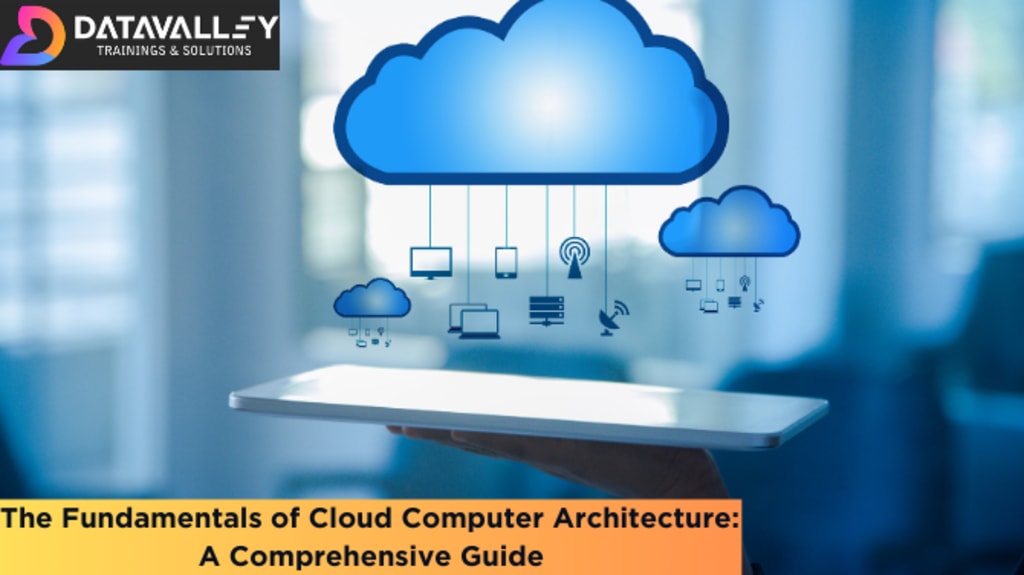The Fundamentals of Cloud Computer Architecture: A Comprehensive Guide
Datavalley.ai

Cloud computing has changed the way businesses store, process, and manage data. Understanding the principles of cloud computing architecture is critical for realizing its full potential. If you're new to cloud computing or want to learn more about it, you've come to the perfect place.
This guide will teach you the fundamentals of cloud computing architecture, including concepts, components, and principles. It's ideal for aspiring architects, curious professionals, and students interested in learning more about cloud computing. At the end, we will also introduce you to Datavalley's Cloud Architect course.
Understanding Cloud Computing
At its core, cloud computing is a technology that allows users to access and use computing resources (such as servers, storage, databases, networking, software, analytics, and intelligence) over the internet, often referred to as "the cloud." It eliminates the need for organizations to own and maintain their own physical data centers and infrastructure.
Cloud computing can be categorized into three main service models:
Infrastructure as a Service (IaaS): IaaS is a cloud computing service that provides virtualized computing resources, such as servers, storage, and networking.
Platform as a Service (PaaS): PaaS provides a platform for developers to build, deploy, and manage apps without worrying about infrastructure.
Software as a Service (SaaS): SaaS is web-based software that you subscribe to and access online. No installation or maintenance is required.
Cloud Computing Architecture:
Cloud computing architecture encompasses the structure and components that make cloud services possible. It is crucial to understand this architecture to harness the full potential of the cloud. Here are the key elements of cloud computing architecture:
1. Cloud Service Providers (CSPs)
Cloud service providers (CSPs) own and operate data centers worldwide, hosting infrastructure for cloud computing. Prominent CSPs include AWS, Azure, GCP, IBM Cloud, and Oracle Cloud.
2. Data Centers
Data centers are the physical facilities where the cloud infrastructure resides. These centers consist of servers, storage devices, networking equipment, and cooling systems. Data centers are strategically located to ensure redundancy, scalability, and reliability.
3. Virtualization
Virtualization allows multiple VMs to run on a single server, improving efficiency, security, and performance.
4. Networking
Networking is a fundamental aspect of cloud architecture. It connects data centers, users, and cloud services. The network infrastructure includes routers, switches, load balancers, and content delivery networks (CDNs) to ensure fast and reliable data transmission.
5. Storage
Cloud storage is essential for data persistence and accessibility. CSPs provide various storage options, including object storage, block storage, and file storage. These services offer scalability and redundancy to meet different data storage needs.
6. Compute
Compute resources are the heart of cloud computing Training . These resources include virtual machines, containers, and serverless computing platforms. Users can provision and scale compute resources on-demand, paying only for what they use.
7. Security and Compliance
Security is paramount in cloud computing. CSPs implement robust security measures, including encryption, identity and access management (IAM), and security groups. Compliance standards like GDPR, HIPAA, and SOC 2 are also addressed to meet regulatory requirements.
8. Scalability and Elasticity
One of the defining features of cloud computing course is its scalability and elasticity. Cloud resources can be easily scaled up or down to accommodate changing workloads. This flexibility allows businesses to optimize costs and performance.
Benefits of Cloud Computing Architecture
Understanding cloud computing architecture is essential for reaping its numerous benefits:
1. Cost Efficiency: Cloud computing reduces upfront infrastructure costs as organizations pay for resources on a pay-as-you-go basis.
2. Scalability: Easily scale resources up or down based on demand, ensuring optimal performance and cost management.
3. Accessibility: Access cloud services from anywhere with an internet connection, enabling remote work and collaboration.
4. Security: Cloud providers invest heavily in security, offering robust protection against data breaches and cyber threats.
5. Agility: Rapidly deploy and test applications, speeding up innovation and time-to-market.
6. Disaster Recovery: Implement robust backup and recovery strategies to safeguard against data loss.
7. Sustainability: Cloud providers are committed to sustainability, reducing the environmental impact of data centers.
Datavalley's Cloud Architect Course
Now that you've gained insight into the fundamentals of cloud computer architecture, you might be wondering how to master this complex domain. Datavalley's Multi Cloud Solutions Architect Master's Program is your pathway to becoming a proficient cloud architect.
See More.....
About the Creator
datavalley Ai
Datavalley is a leading provider of top-notch training and consulting services in the cutting-edge fields of Big Data, Data Engineering, Data Architecture, DevOps, Data Science, Machine Learning, IoT, and Cloud Technologies.
Enjoyed the story? Support the Creator.
Subscribe for free to receive all their stories in your feed. You could also pledge your support or give them a one-off tip, letting them know you appreciate their work.






Comments
There are no comments for this story
Be the first to respond and start the conversation.